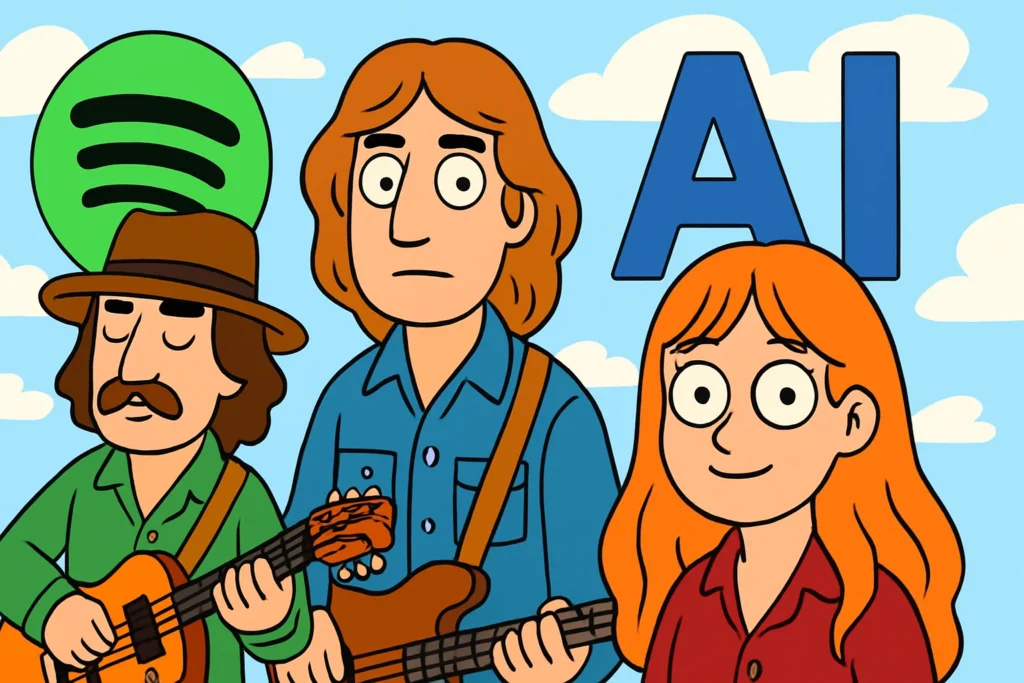A mysterious band with half a million Spotify listeners just confessed it’s an ‘art hoax’ powered by AI. Here’s how Velvet Sundown tricked the internet—and why it matters for music’s future.
In an age when streaming numbers can be gamed and digital hype often trumps human talent, one story stands out: Velvet Sundown. In just weeks, this seemingly unknown “band” exploded on Spotify, collecting over 500,000 monthly listeners. Their retro sound and dreamy photos hinted at a nostalgic revival—until Rolling Stone exposed what many suspected.
Velvet Sundown isn’t real. Or at least, not in the way most fans hoped.
A spokesperson for the “band” has now confessed what suspicious Reddit threads and TikTok sleuths speculated: Velvet Sundown used the generative AI platform Suno to create their music. Worse, they knew it all along—and intentionally misled fans to see what would happen.
Key Takeaways
- Velvet Sundown’s songs were partially AI-generated using Suno.
- The band denied AI rumors for weeks to fuel curiosity.
- Their viral streaming success reveals gaps in Spotify’s guardrails.
- The story raises fresh questions about AI’s role in the future of music.
A Sudden Rise—and A Fake Story
Velvet Sundown appeared out of nowhere. In June, two albums popped up on Spotify, Apple Music, Amazon Music—everywhere. Their songs, described as “Seventies psychedelic textures with cinematic alt-pop,” quickly filled playlists.
But a closer listen revealed the cracks. Songs like Dust on the Wind felt like uncanny covers of classic rock tropes—generic, polished, eerily soulless. Band photos shared on their X (formerly Twitter) account glowed with the unmistakable sheen of AI-generated imagery.
Reddit detectives spotted the oddities first. Music blogger Chris Dalla Riva fanned the flames on TikTok. Even the streaming service Deezer flagged some tracks as potentially AI-made. Meanwhile, investigative site Music Ally traced most playlist placements to just four Spotify accounts—highly unusual for an unknown indie act.
Still, Velvet Sundown stayed quiet—at least publicly. On X, they slammed “lazy, baseless” theories about AI involvement. One post declared, “This is our music, written in long, sweaty nights in a cramped bungalow in California with real instruments, real minds, and real soul.”
It turns out, that was just another piece of performance art.
Rolling Stone Gets the Truth
Earlier this week, Rolling Stone called Velvet Sundown’s bluff. In a revealing phone call, spokesperson and self-described “adjunct member” Andrew Frelon admitted what they’d denied: AI was involved—he just couldn’t (or wouldn’t) say exactly where.
At first, Frelon insisted Suno only helped with brainstorming. Minutes later, he confirmed the AI platform shaped some final tracks—though he refused to name which ones. Velvet Sundown also used Suno’s “Persona” feature, which clones a singer’s voice to keep it consistent across songs—similar to how big-name producer Timbaland is experimenting with AI vocals.

Frelon shrugged off concerns about misleading fans. To him, Velvet Sundown is an art hoax, a deliberate prank on modern music’s blurred lines between real and fake. “People didn’t care about what we did before,” he told Rolling Stone. “Now suddenly, we’re talking to Rolling Stone. So… is that wrong?”
A Hoax With a Message
In Frelon’s eyes, Velvet Sundown follows a tradition of “art hoaxes.” He points to the Leeds 13—a group of British art students who famously staged fake photos of a beach trip bought with scholarship money. That stunt sparked national outrage but raised big questions about what “art” really is.
“We live in a world where fake things sometimes have more impact than real things,” Frelon said. “Is that messed up? Sure. But should we ignore it, or lean in?”
It’s a valid question—especially as AI infiltrates every corner of music, from ghostwriting lyrics to cloning vocals of dead artists.
How Did They Game Spotify?
One mystery remains: how did a fake band with no fans rack up half a million listeners overnight?
Some suspect shady playlist manipulation—a common trick where bot-driven accounts juice play counts by inserting songs into popular playlists. Frelon sidestepped that question. “I’m not running the Spotify backend stuff,” he said. “We got on some big playlists. It spiraled.”
Music Ally’s reporting suggests that most Velvet Sundown streams came from just four Spotify accounts, raising eyebrows about how “organic” this viral moment really was. Spotify, for its part, has no explicit ban on AI music. And as one former Spotify data scientist told Rolling Stone, fake listeners used to be the bigger problem—now it might be fake music.
AI and Music’s Future
Whether Velvet Sundown was a clever stunt or shady hustle, its viral rise highlights a new reality for the music industry. AI can make a band overnight. It can mimic old sounds, replicate familiar vocals, and fill Spotify with infinite “new” tracks. If the recommendation algorithms like it, even a made-up band can top playlists.
Is that good or bad? Some artists see AI as just another tool—like drum machines or sampling once were. Others fear it cheapens human creativity.
Frelon, for one, says fans should get used to it. “People have strong emotions about this, but music moves forward through experiments. Sometimes they fail, sometimes they don’t,” he said. “You don’t have to please everyone.”
One veteran A&R executive thinks the hoax is only the beginning. “A real hit song made by AI is coming,” he told Rolling Stone. “When it happens, people won’t care if it’s real or fake—if they love it, that’s it.” For now, Velvet Sundown’s bluff is out in the open. Their viral streams are real enough. Whether the music is—or needs to be—might be the question of our time
